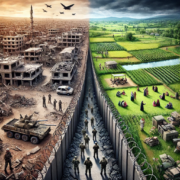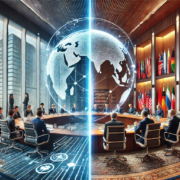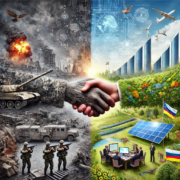The Status Quo: A Zero-Sum Game
The current geopolitical climate surrounding Crimea is entrenched in a zero-sum mentality, where one party’s gain is inevitably perceived as another’s loss. This antagonistic approach has perpetuated conflict, sustaining a relentless cycle of sanctions, military expenditures and territorial disputes. These actions have exacerbated tensions, leaving no room for meaningful progress towards peace and stability.
Changing the Narrative: “From Destruction to Construction”
Our vision offers a radical departure from this detrimental status quo by proposing a transformative shift:
Leveraging Frozen Assets and Matching EU Funds to rebuild and develop Crimea. This strategy not only breaks the impasse but also turns it into a truly mutually beneficial opportunity.
A Visionary Approach: Strategic Reinvestment and the European Development Government (EDG)
Localized Development Initiatives
Instead of continuing to funnel resources into conflict, we advocate for redirecting frozen Russian and EDG assets towards regional development in Crimea. This strategic reinvestment shifts the narrative from destruction to construction, creating significant economic opportunities that benefit all conflict parties. By investing in infrastructure, education, healthcare and local businesses, we generate immediate, tangible benefits, encouraging goodwill and the needful huge, international support.
Public-Private Partnerships
Engaging multinational corporations and local enterprises through public-private partnerships amplifies funding and expertise, ensuring robust and sustainable growth. This collaboration bridges the gap between local needs and global capabilities, paving new ways for a thriving regional economy.
European Development Government (EDG)
Neutral Governance
We propose establishing a temporary governance structure, the European Development Government (EDG), under the EU’s auspices. This neutral body would manage development projects transparently, ensuring that investments benefit the local population and the broader region. By including representatives from key international stakeholders and local governance bodies, the EDG addresses the interests and concerns of all conflict parties, enhancing both, legitimacy and cooperation.
Inclusive Representation
Incorporating representatives from international stakeholders (such as the UN and OSCE) alongside local governance bodies ensures that all voices are heard and all interests are addressed transparently. This comprehensive approach builds trust and collaboration, which are essential for the project’s success.
Transforming Crimea: Europe’s New “Silicon Valley” or “Neom”
Our vision for Crimea is ambitious: transforming the region into Europe’s new “Silicon Valley” or “Neom.”
This involves creating Special Economic Zones (SEZs) with tax incentives and simplified regulations to attract foreign direct investment (FDI). By focusing on high-tech industries, renewable energy and tourism, Crimea can become a leading hub of innovation and economic growth.
Economic Zones of Rapid Growth
Developing SEZs and innovation hubs in Crimea attracts international investment, technology and talent. These zones drive economic growth, mitigate the economic strains caused by conflict and provide a model for peaceful economic collaboration. By establishing partnerships with leading universities and tech companies, Crimea can be positioned as a beacon of innovation and sustainable development.
Long-term Vision and Stability
A initial 10 year EDG commitment to sustainable development ensures a substantial timeline to achieve significant goals. By focusing on renewable energy, sustainable agriculture, and green infrastructure, we not only address immediate needs but also position Crimea as a model for environmental stewardship and long-term prosperity. Educational and cultural exchange programs can further rebuild human capital and nurture cooperation between the currently conflicting parties.
Implementation and Negotiation Approach
Building Consensus
Conflict Resolution Workshops
To ensure the success of this proposal, it is crucial to gain widespread support from key stakeholders, including Russia, Ukraine, the EU and international entities like the UN. Extensive back-channel discussions are necessary to ensure the plan addresses core interests and concerns. Conducting conflict resolution workshops for political leaders and local communities promotes understanding and peaceful conflict resolution.
Incremental Confidence-Building Measures
Starting with small, confidence-building projects can gradually rebuild trust and demonstrate the feasibility –of the larger vision. These initial successes pave the way for more ambitious initiatives, showcasing the impressive potential for truly transformative change.
Legal and Financial Frameworks
Third-party Audits and Transparency Mechanisms
Establishing transparent legal and financial structures for managing and disbursing frozen assets is crucial. Implementing third-party audits and real-time transparency mechanisms enhances trust and accountability, ensuring ethical and efficient management of resources.
International Development Funds
A dedicated international development fund, managed by a coalition of stakeholders, oversees the allocation and disbursement of resources. This centralized management ensures that funds are used effectively and equitably, maximizing their impact.
Security Guarantees
Demilitarized Zones
Creating demilitarized zones around key infrastructure projects prevents military escalation and ensures the safety of workers and residents. These zones act as safe havens for development, free from the threat of conflict.
Joint Security Forces
Forming joint security forces composed of personnel from multiple stakeholders oversees security collaboratively. This shared responsibility ensures comprehensive protection and establishes a new sense of mutual trust.
Public and Political Buy-in
Media Campaigns
Launching media campaigns to inform and engage the public builds broad-based support for the project. Transparent communication about the benefits and progress of the initiative fosters trust and enthusiasm among local and international audiences.
Stakeholder Forums
Regular forums with all stakeholders, including civil society organizations, gather input, address concerns, and build broad-based support. Inclusive planning ensures that the project remains responsive to the needs and aspirations of all affected communities.
Phased Implementation and Adaptability
Pilot Projects
Starting with pilot projects in less controversial areas can demonstrate the feasibility and benefits of the larger vision. These initial successes build incremental trust and provide valuable data for scaling up—A new role model for conflict resolution worldwide.
Flexible Frameworks
Developing adaptable frameworks with regular reviews ensures that the project remains responsive to changing conditions. This flexibility allows for adjustments based on feedback and evolving circumstances, ensuring sustained progress.
Innovative Solutions
Blockchain for Transparency
Utilizing blockchain technology ensures transparency and traceability of funds and project progress. This innovative approach enhances trust among stakeholders and ensures ethical management of resources.
Renewable Energy Projects
Focusing on solar and wind energy projects addresses energy needs sustainably and attracts green investments. This alignment of economic growth with environmental sustainability positions Crimea as a leader in renewable energy and carefully balanced energy mix.
Cultural and Environmental Heritage Parks
Develop large-scale cultural and environmental heritage parks that preserve and promote the region’s history and biodiversity. These parks serve as both tourist attractions and educational centers, establishing a deeper appreciation for Crimea’s unique cultural and natural heritage.
Green Energy and Zero-Waste Initiatives
Commit to making Crimea a zero-waste region powered entirely by renewable energy. Implementing comprehensive recycling programs, waste-to-energy plants and widespread use of renewable energy sources can attract significant green investments and position Crimea as a global leader in sustainable living.
Peace-Building through Sports Diplomacy
Establish international sports academies and host peace-themed sports events in Crimea. Sports can be a powerful tool for building bridges between communities, promoting a sense of camaraderie and mutual respect.
Highlight: Crimea – This World’s Peace, Diplomacy & Negotiation Education Hub
Our most ambitious vision is to transform Crimea into a global hub for peace, diplomacy, and negotiation education. By establishing international institutes for peace and diplomacy studies, offering courses and research opportunities in conflict resolution, international relations, and sustainable development, Crimea can become a beacon of peace and diplomacy, influencing global thought and policy-making. Educating future leaders in these fields will not only contribute to regional stability but also project a powerful image of transformation and leadership in global peace efforts.
Final Thoughts
This comprehensive and ethical vision ensures a transparent, inclusive, and sustainable pathway to peace and development, making it a go-to strategy for all conflict parties involved. By adopting this transformative approach, which safeguards the dignity of all parties and is likely to generate broad public approval in each conflict country, we create a brighter, more prosperous future for Crimea and its people. Our vision not only addresses immediate challenges but also sets the stage for long-term stability and growth, redefining Crimea as this world’s exemplary region for overcoming the constraints of any territorial or geographic disputes.
Hashtags: #ChangeNarrative #FromDestructionToConstruction #ShareCrimea



